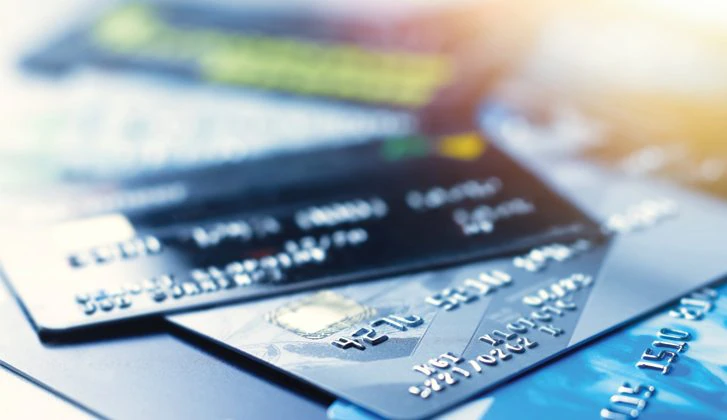NOTICE: Internet Explorer was retired by Microsoft on June 15th, 2022 and is no longer supported. This could change how you access Online Banking.
Are Hard Times Pushing You to Make These 6 Credit Card Mistakes?

Economic downturns, looming recessions, and rising inflation can shake your financial stability. In these times, credit cards can seem like an immediate solution – but leaning too heavily on them might set you up for future pitfalls. When it’s time to batten down your financial hatches, making wise choices regarding credit card use is more important than ever.
Here are 6 credit card mistakes to avoid when times are tough.
1. Forsaking Your Savings
Having insufficient savings can leave you vulnerable during financial downturns. To effectively ward off unnecessary debt and maintain your lifestyle, your savings should grow at a pace that matches or surpasses inflation. Otherwise, you might find yourself turning to credit cards more often than you’d like.
Search for high-yield savings options, money market accounts, certificates of deposit, or share certificates that fit your needs and current financial situation. Even a small amount of savings can make a big difference.
2. Keeping the Same Spending Habits
Any time your financial landscape changes, your budget must adjust accordingly. For instance, as daily essentials like gas, internet, and cell phone bills increase, your discretionary or fun expenses may need to decrease. If you use the 60-20-20 rule – where 60% of your income goes to living expenses, 20% to savings, and 20% to fun – you might adjust your living expenses to 70% and your fun expenses to 10%. Scrutinizing your budget can help you differentiate between needs and wants and identify areas with flexibility that could help balance out rising costs.
For example, you might reduce the number of subscriptions you have, choose to replace at least one night out a month with a fun night in, and search for more cost-efficient options for your phone service or groceries. If you’re still financially strained, solutions like pursuing side jobs or sharing living expenses can help. Draft a new budget that rebalances your income and expenses to help reduce the pressure to use credit – and help you strategize when and where you do use it.
3. Becoming Too Reliant on Your Credit Limit
Are you counting on your high credit limit to have your back until inflation cools down? If so, it could be a mistake. Credit card companies may face their own struggles during economic downturns, and they can choose to alter your credit limit or terms without seeking your approval. This means the safety net you thought you had might suddenly shrink. You could always request a credit limit increase if your account is in good standing, but this might result in a hard inquiry on your credit report, which might temporarily affect your credit score.
Credit cards are one of the more expensive ways to borrow money, often carrying high interest rates. Accumulating too much high-interest debt could leave you unable to pay it off – and cost you thousands in interest.
The bottom line: Credit should serve as a backup, not a primary financial strategy.
4. Making Late Payments
Late fees on credit cards can quickly snowball into a significant financial burden. If you anticipate missing a payment deadline, it’s crucial to reach out to your credit card issuer immediately. Not only can credit card late fees cost up to $30 for the first offense and up to $41 for subsequent ones, but these fees apply regardless of how small your outstanding balance might be. Plus, most credit card issuers will compound interest charges daily for unpaid balances, so you could end up paying interest on the late fee and any interest you’ve accumulated.
Beyond the immediate impact, persistent late payments can severely affect your credit score. In economic downturns, this is especially risky. Should you face job loss or reduced hours as employers tighten their belts, maintaining a healthy credit score could be the difference between securing a lifeline loan or facing even more challenging financial hurdles.
Always be proactive about your credit card payments. Establishing automatic payments can help you stay on top of them – just be sure the funds are available in your payment account.
5. Using Cash Advances
Although a credit card cash advance can seem like a convenient solution for immediate cash needs, it’s one of the most expensive options. The moment you take out a cash advance, interest begins accruing, often at rates higher than your card’s standard interest rate for overdue balances. Additionally, fees for this service can be hefty.
When possible, charge the expense directly to your credit card instead. If that’s not an option and you have time before you need the cash, check with your financial institution about consolidating your credit card debt into a personal loan, which often offers better terms and rates than a cash advance.
6. Carrying a Large High-Interest Balance
Carrying a substantial balance on a high-interest credit card can dramatically escalate the cost of your purchases as interest quickly accrues. Carrying a balance results in compounding interest, meaning you end up paying interest on accumulated interest, which can lead to mounting debt and unexpected financial strain.
Make it a goal to pay your total credit card balance each month to help maintain your credit health and avoid getting caught in snowballing debt. If you do wind up carrying a balance, prioritize paying it down as quickly as possible to minimize the interest you’ll pay.
Exploring the Alternatives
When your financial situation is less than ideal, you still have to make ends meet. If you find yourself weighed down by high-interest credit card debt, consider exploring other options, especially if your credit is in good standing. Personal loans often have lower interest rates than the average credit card, potentially giving you a smaller monthly payment and saving you money on interest over time.
A balance transfer credit card could also be a game-changer. With a balance transfer, you move the balance from a high-interest credit card to a new credit card with better terms. Often, balance transfer cards have introductory offers, like 0% APR for 12 months, which can help you save significantly on interest and pay down your debt faster. However, you must choose a balance transfer card wisely. Choose one with little to no balance transfer fees, and be sure you understand the duration of any promotional rates.
Make the Hard Times Easier
Partnering with the right financial institution can also help you navigate shaky economic conditions with more confidence and ease. Reach out to discuss your alternatives to high-interest credit card debt and work toward a healthier financial future. Ready to speak to someone today?
Find Your Local Banking Center
Content is for informational purposes only and is not intended to provide legal or financial advice. The views and opinions expressed do not necessarily represent the views and opinions of WesBanco.
While we hope you find this content useful, it is only intended to serve as a starting point. Your next step is to speak with a qualified, licensed professional who can provide advice tailored to your individual circumstances. Nothing in this article, nor in any associated resources, should be construed as financial or legal advice. Furthermore, while we have made good faith efforts to ensure that the information presented was correct as of the date the content was prepared, we are unable to guarantee that it remains accurate today.
Neither Banzai nor its sponsoring partners make any warranties or representations as to the accuracy, applicability, completeness, or suitability for any particular purpose of the information contained herein. Banzai and its sponsoring partners expressly disclaim any liability arising from the use or misuse of these materials and, by visiting this site, you agree to release Banzai and its sponsoring partners from any such liability. Do not rely upon the information provided in this content when making decisions regarding financial or legal matters without first consulting with a qualified, licensed professional.
Explore WesBanco Insights
Discover how WesBanco can help you prepare for the road ahead. Gain exclusive insights and learn how to achieve your financial goals.
Education & Insights



